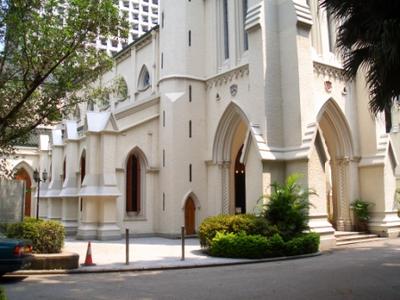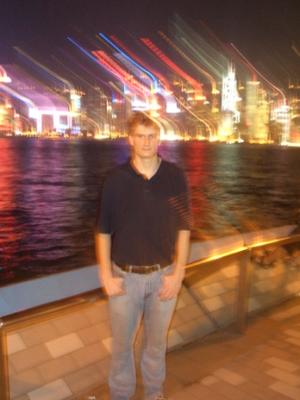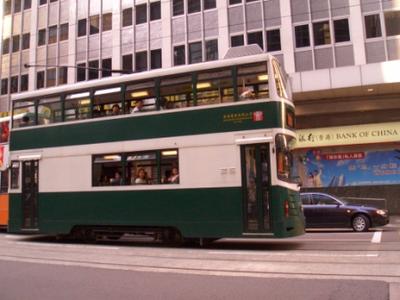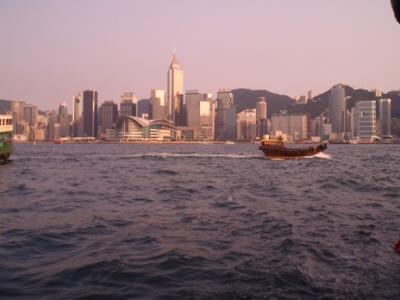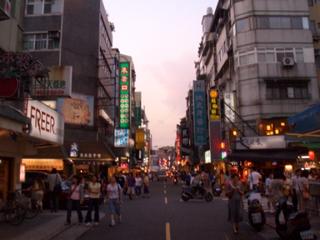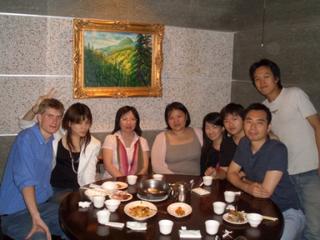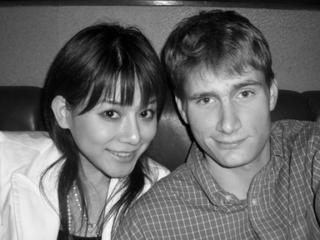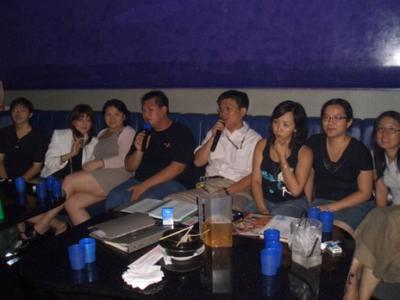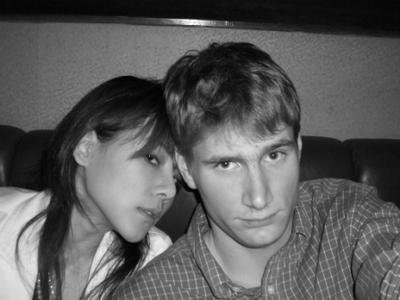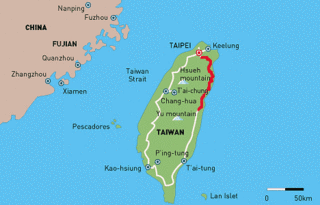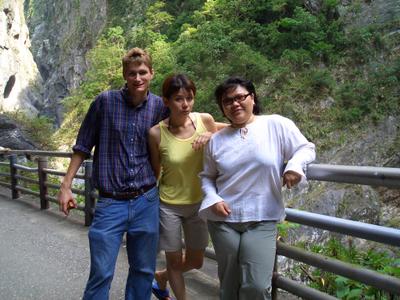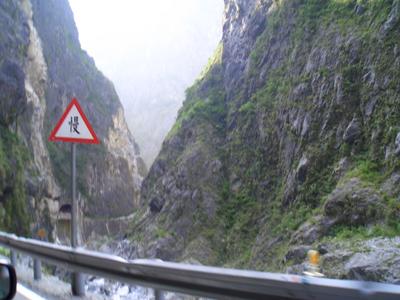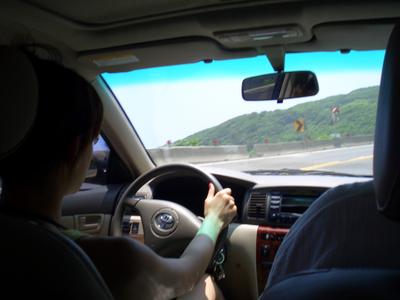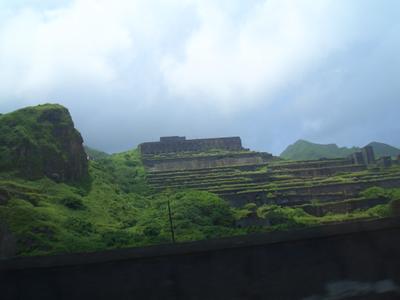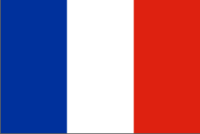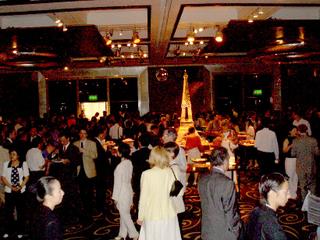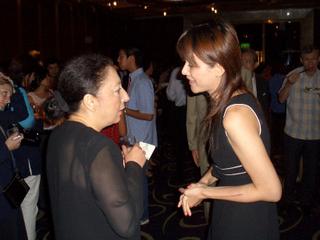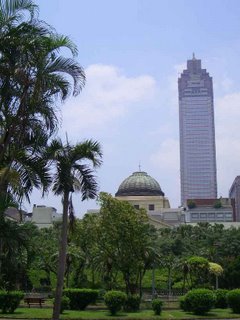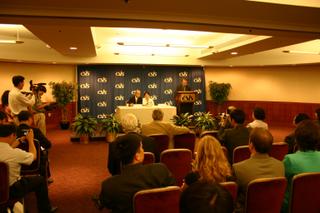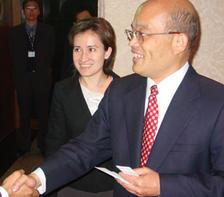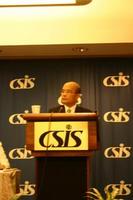Hong Kong
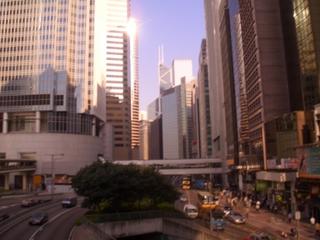 Please see below for two posts on the conclusion of my trip to Taiwan.
Please see below for two posts on the conclusion of my trip to Taiwan.I arrived in Hong Kong on Monday, and yesterday I did a whirlwind walking tour of the city that took many hours and left me totally exhausted. But of course it was worth it.
The past two nights I've been staying in a tiny room in a tiny apartment where Jon Atkinson '06 is living, it's about half an hour outside of downtown. Jon has been here all summer, he's working for a Taiwanese electronics company that has offices here.
The first night, I stayed up until 1 in the morning talking with Benny, Jon's Taiwanese roommate, who works for the same company as Jon. Unlike people in Hong Kong, who seem relatively apathetic, Taiwanese people everywhere seem to care a lot about their complicated political world. Benny, whose wife and children were all DPP
 supporters, had strong opinions about both the DPP and the KMT, as well as his experiences working for two years in China. Benny's parents immigrated to Taiwan after the Chinese civil war. He felt that the DPP harped on racial tensions to draw out votes, their platform was outdated, and their track record on business was poor (he cited the past scuffle with the German company Bayer). He also noted that there are now 200,000 Taiwanese living in Shanghai (I'm not sure if this number is right), among them many friends, and he said that among many of his friends and their families living in Shanghai there was a clear pattern: at first they would come back to Taiwan every month, then every six months, then every year, and then... suddenly they were really living in China. It was a fascinating conversation.
supporters, had strong opinions about both the DPP and the KMT, as well as his experiences working for two years in China. Benny's parents immigrated to Taiwan after the Chinese civil war. He felt that the DPP harped on racial tensions to draw out votes, their platform was outdated, and their track record on business was poor (he cited the past scuffle with the German company Bayer). He also noted that there are now 200,000 Taiwanese living in Shanghai (I'm not sure if this number is right), among them many friends, and he said that among many of his friends and their families living in Shanghai there was a clear pattern: at first they would come back to Taiwan every month, then every six months, then every year, and then... suddenly they were really living in China. It was a fascinating conversation.I guess it's typical to say so, but Hong Kong really does feel like the future -- a vast urban paradise of glass and cutting-edge technology where long walking paths have been converted into escalators (the longest in the world is here, it takes 20 minutes to walk to the whole thing). It's also peculiarly British, with colonial buildings inbetween skyscrapers here or there, and twisted, old world cobbled streets, double-decker buses, tons of pubs, and cars driving on the left side of the road.
I agree with Bryan, who pointed out to me that Hong Kong truly is an international city, much more so than Taipei. When I first arrived downtown the people and languages around me were all so different -- a businessman walked by on his cell
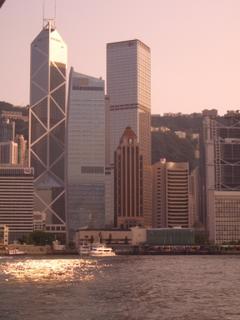 phone talking in Danish, two well-dressed English investment bankers hustled past me, a brightly-colored American tourist family was looking at a big map. Later, I spent some time praying at St. John's, the beautiful Anglican church here, and when I walked outside listened as a Hong Kong family passed by speaking Cantonese and the English pastor, his wife, and two children, spoke with a visiting Irish woman.
phone talking in Danish, two well-dressed English investment bankers hustled past me, a brightly-colored American tourist family was looking at a big map. Later, I spent some time praying at St. John's, the beautiful Anglican church here, and when I walked outside listened as a Hong Kong family passed by speaking Cantonese and the English pastor, his wife, and two children, spoke with a visiting Irish woman.Unlike the overwhelming hospitality I experienced in Taiwan, people in Hong Kong aren't nice, but they aren't not nice either. From what Jon tells me, they work
 very, very hard, they love to earn and spend money, and they don't have much time for anything else -- like being nice to foreigners or politics. Jon made a comment to me that I find very telling -- whenever he asks someone from Hong Kong what they do for fun, the answer is invariably "shopping at the mall."
very, very hard, they love to earn and spend money, and they don't have much time for anything else -- like being nice to foreigners or politics. Jon made a comment to me that I find very telling -- whenever he asks someone from Hong Kong what they do for fun, the answer is invariably "shopping at the mall."I purchased my visa to enter the People's Republic yesterday, as well as my ticket for the 24-hour sleeper-train adventure to Beijing. Through my train window, I will see a long, thin slice of China that cuts all the way down the East coast of the country. I will meet up with five dudes in Beijing for a few hours, before all of us head out together for Western China.
I'll keep you posted.
